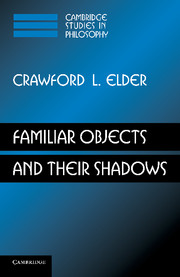Book contents
- Frontmatter
- Contents
- Acknowledgments
- Introduction
- 1 Two false friends of an ontology of familiar objects
- 2 Conventionalism as ontological relativism
- 3 Realism about material objects: persistence, persistence conditions, and natural kinds
- 4 Ontological preference for the temporally small
- 5 Ontological preference for microphysical causes
- 6 Ontological preference for the spatially small
- 7 A third false friend of familiar objects: universal mereological composition
- 8 Concluding Hegelian postscript
- Appendix: “Mutually interfering” dimensions of difference
- References
- Index
7 - A third false friend of familiar objects: universal mereological composition
Published online by Cambridge University Press: 25 January 2011
- Frontmatter
- Contents
- Acknowledgments
- Introduction
- 1 Two false friends of an ontology of familiar objects
- 2 Conventionalism as ontological relativism
- 3 Realism about material objects: persistence, persistence conditions, and natural kinds
- 4 Ontological preference for the temporally small
- 5 Ontological preference for microphysical causes
- 6 Ontological preference for the spatially small
- 7 A third false friend of familiar objects: universal mereological composition
- 8 Concluding Hegelian postscript
- Appendix: “Mutually interfering” dimensions of difference
- References
- Index
Summary
Metaphysicians who are sceptical about familiar objects for the most part suppose that the world is really populated by the fundamental particles of completed microphysics, or by mereological simples – or by both, should the fundamental particles turn out to be mereological simples. They then must explain why the world at least appears to contain objects that are so much larger, objects such as dogs and trees and boulders. The metaphysicians considered in the previous chapter suppose that they can explain this appearance by holding that adverbially identified “arrangements” obtain among the microparticles, such as dogwise and treewise arrangement. But other proponents of an ontology of the small respond differently. They hold that there really are unitary large objects, in all of the volumes in which common sense supposes a familiar object to be present, and that this follows merely from the premise that each of those volumes is occupied by microparticles or simples. These philosophers are adherents of UMC (universal mereological composition). In this chapter I argue that UMC is both unmotivated and untenable; the only way to have unitary, relatively large, objects in all the volumes where common sense supposes familiar objects to be present is to have familiar objects themselves.
But even apart from its relation to the ontology of familiar objects, UMC is of considerable intellectual interest.
- Type
- Chapter
- Information
- Familiar Objects and their Shadows , pp. 139 - 165Publisher: Cambridge University PressPrint publication year: 2011

